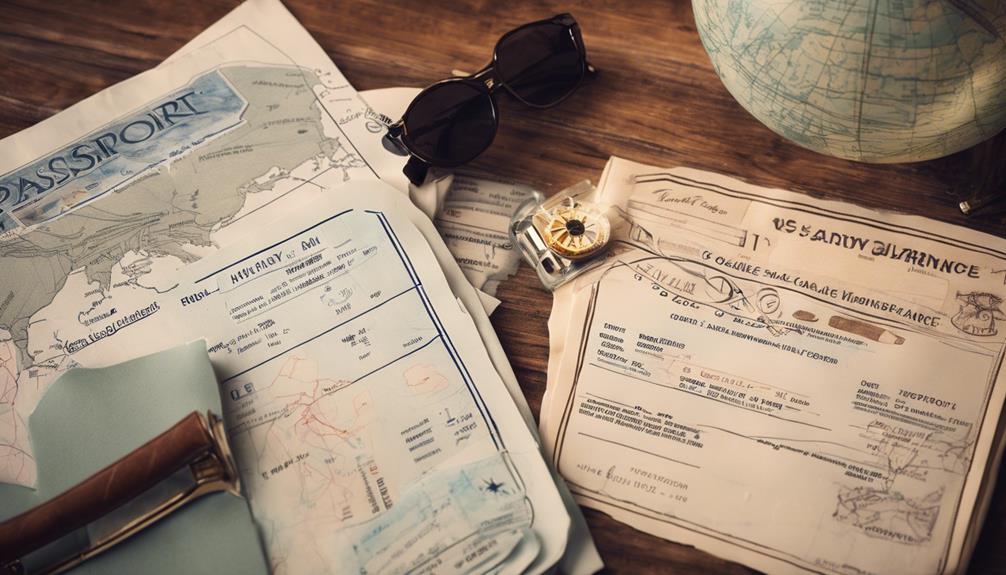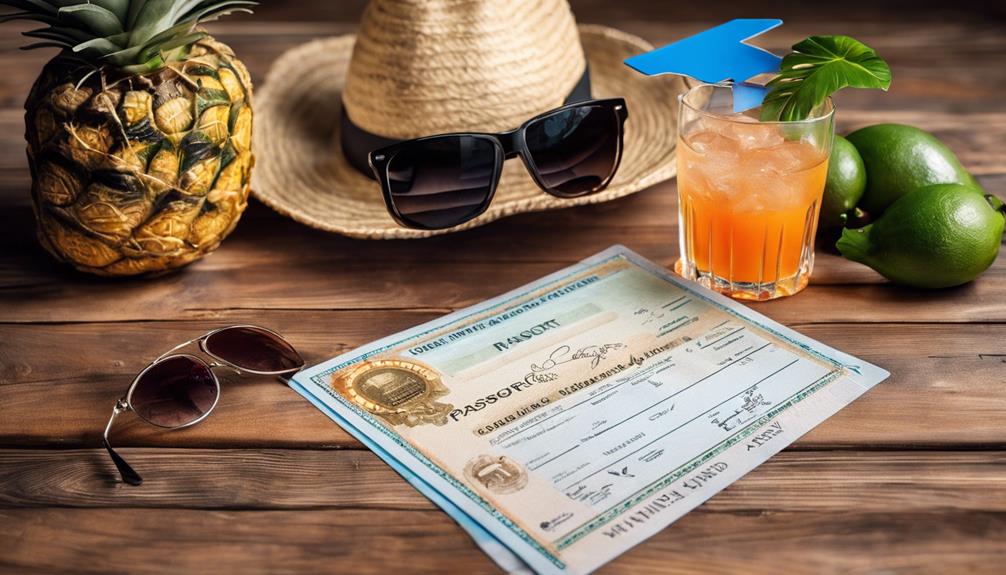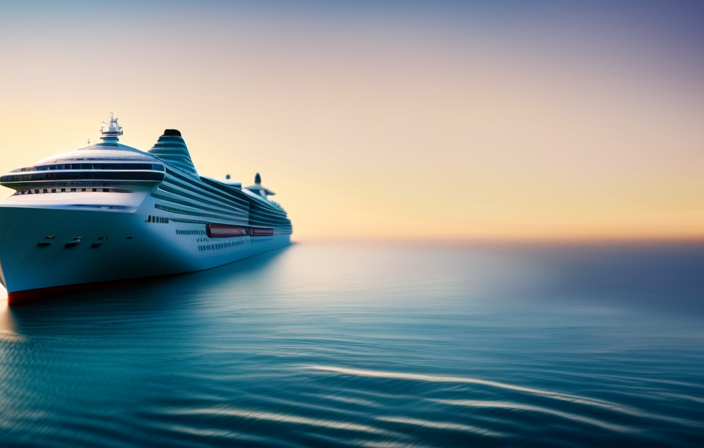As we embark on our cruise voyage, we are met with a blend of excitement and a sense of necessary preparedness. Picture yourself at the entrance of the ship, with the sea breeze gently hinting at adventures in distant lands.
Now, imagine the scenario where you're missing a vital document needed to board the vessel. The importance of having all necessary paperwork may not be immediately apparent, but it can make or break your entire journey.
Let's explore the key documents that should be securely tucked into your travel arsenal before setting sail.
Key Takeaways
- Obtain valid passports and research visa requirements for smooth international travel.
- Always carry boarding passes and essential identification documents for seamless check-in.
- Prioritize health and safety measures, including COVID-19 requirements and travel insurance.
- Prepare emergency contacts and document copies for unforeseen situations during your cruise.

2 Pack Passport Cover With Card Slots RFID Blocking-White&Black
※【Multi-Purpose】:The passport holder with 2 fuction, vaccine card holder and passport holder, transparent pocket is for the vaccine…
As an affiliate, we earn on qualifying purchases.
As an affiliate, we earn on qualifying purchases.
Passports
When embarking on a cruise, securing a valid passport is crucial for smooth international travel and on-shore excursions involving border crossings. Your passport is your ticket to exploring foreign countries and experiencing different cultures during your cruise adventure. It's important to note that passports must be valid for at least 6 months after the cruise ends for international travel, so make sure to check your passport expiration date well in advance.
Having a valid passport not only allows you to enter foreign countries seamlessly but also ensures a quick return to the U.S. in case of emergencies or unexpected situations during the cruise. While U.S. citizens may have the option to use a U.S. birth certificate for closed-loop cruises, it's always recommended to carry a passport for added convenience and peace of mind.

BOACAY Travel Document Organizer with RFID, Family Passport Holder, Wallet for Women & Men, Portable & Waterproof Case for Cards, Boarding Pass, Money
Keep your documents, money & credit cards secure with this RFID-blocking travel wallet & passport holder. Our travel…
As an affiliate, we earn on qualifying purchases.
As an affiliate, we earn on qualifying purchases.
Visas
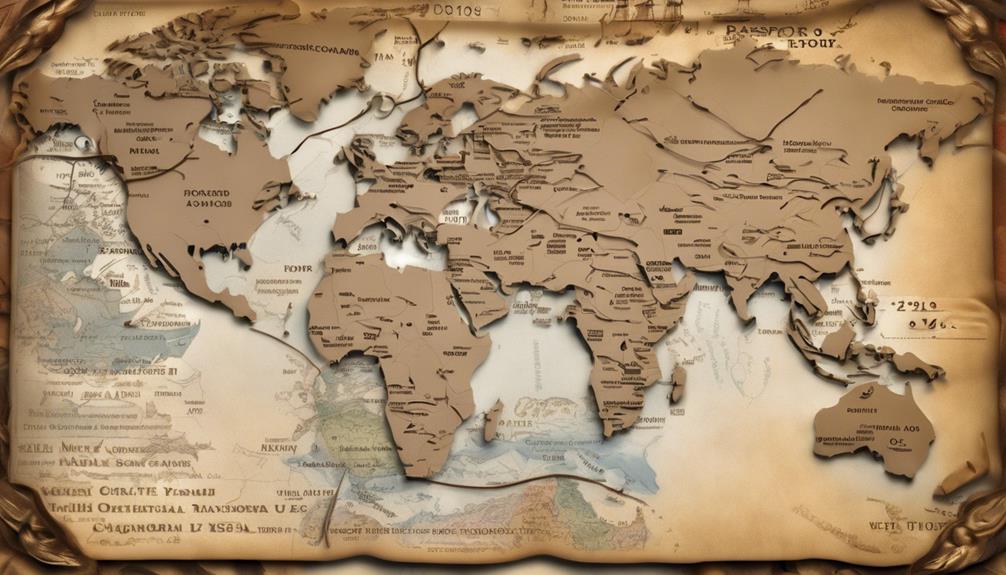
When it comes to visas for your cruise travels, understanding the requirements and application process is crucial. Different countries may have varying rules, and some may even offer visa services through the cruise line.
It's essential to stay informed and have all the necessary documents ready to ensure a smooth sailing experience.
Visa Requirements
Understanding the visa requirements for each country on your cruise itinerary is crucial for a smooth and stress-free travel experience. Visa requirements can vary depending on the port of call, and some countries may offer visas upon arrival for cruise passengers.
To ensure you have the necessary documentation, research the visa requirements for every destination you'll visit during your cruise. It's advisable to check official government websites for the most accurate and up-to-date information on visa requirements.
Certain cruise lines may also provide assistance in obtaining visas for specific destinations, so it's worth exploring these options to make your travel preparations hassle-free.
Stay informed and prepared to enjoy your cruise without any visa-related disruptions.
Application Process
Researching the visa requirements for each country on your cruise itinerary is crucial, and now we will explore the practical steps involved in the visa application process. When applying for visas, ensure you have your passport, boarding passes, and other necessary documents in order. The table below outlines key aspects to consider during the visa application process:
| Visa Application Process | Key Steps |
|---|---|
| Research Requirements | Check official government websites for accurate information. |
| Application Submission | Submit required documents and fees in a timely manner. |
| Follow-Up | Track application status and address any additional requirements promptly. |

Insight Guides Cruising & Cruise Ships 2024 (Cruise Guide with eBook)
As an affiliate, we earn on qualifying purchases.
As an affiliate, we earn on qualifying purchases.
Boarding Passes
When it comes to cruise boarding passes, understanding the check-in requirements is crucial for a smooth embarkation process.
We'll explore the differences between digital and printed passes and how each can impact your boarding experience.
Let's make sure we've all the necessary details in place before setting sail!
Check-In Requirements
To streamline the cruise check-in process efficiently, acquiring and preparing your boarding pass is essential. Your boarding pass contains crucial information such as your check-in status, boarding time, onboard account setup, and personal details.
Whether it's a digital pass on your mobile app or a printed copy, having it ready will expedite your boarding at the port. Additionally, don't forget to attach luggage tags with your name and cabin number to your bags for easy identification on the ship.
When flying to the port, secure your luggage tags with duct tape to prevent them from getting lost during travel. Being well-prepared with your boarding pass and luggage tags will make the check-in process a breeze, allowing you to start your cruise adventure smoothly.
Digital Vs. Printed
Choosing between a digital or printed boarding pass for your upcoming cruise can significantly impact your check-in experience and overall convenience. Electronic boarding passes, accessible through mobile apps, offer efficiency, while a printed copy can speed up the terminal check-in process. To ensure a smooth boarding process, it's advisable to have both versions on hand for redundancy.
Remember to attach the provided luggage tags with your name and cabin number to easily identify your belongings during boarding. If flying to the cruise departure port, secure the luggage tags with duct tape to prevent loss in transit. By considering these tips and having both digital and printed boarding passes ready, you'll streamline your cruise embarkation process and set sail stress-free.

Foolproof French Visas: Complete 2026 Edition
As an affiliate, we earn on qualifying purchases.
As an affiliate, we earn on qualifying purchases.
Health Information
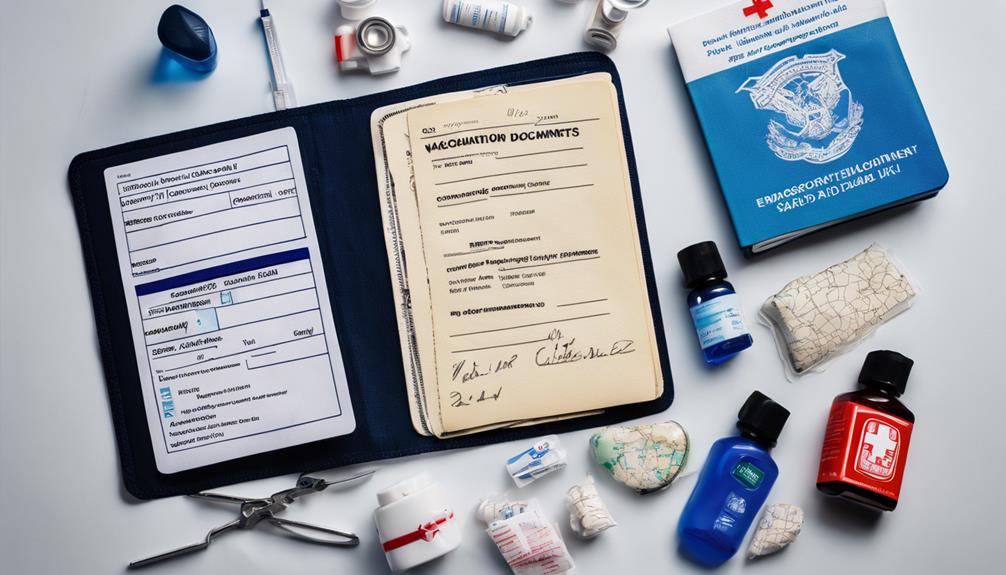
Ensuring you have all the necessary health documents in order is crucial before embarking on a cruise adventure. When it comes to health information for your cruise, here are a few key points to keep in mind:
- Health Forms: Before boarding, you'll likely need to fill out health forms that include COVID-19 related questions. This is a standard procedure to ensure the safety of all passengers.
- COVID-19 Vaccination Proof**: Check if your cruise requires proof of COVID-19 vaccination. Having this documentation ready can help streamline the boarding process.
- Visa Requirements**: Research the visa requirements for the countries on your cruise itinerary. Ensuring compliance with health regulations, including any specific visa requirements, is essential for a smooth sailing experience.
Destination-Specific Documents
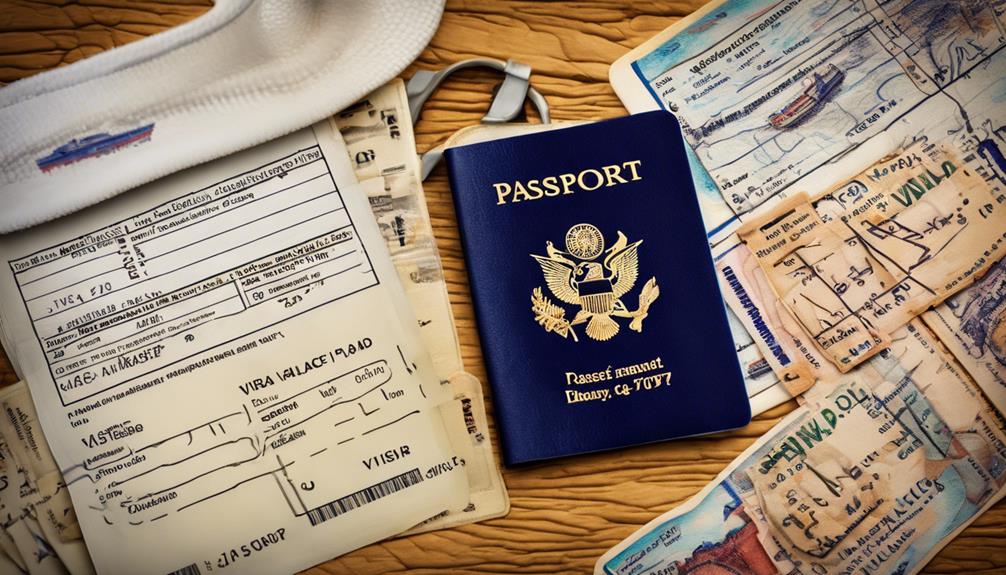
Gathering destination-specific documents is essential for a seamless cruise experience, ensuring smooth entry at each port of call. Before embarking on your journey, remember to check if any of the countries on your itinerary require a visa for entry. Some destinations might also have specific health requirements, such as mandatory vaccinations or health clearances. It's crucial to research and comply with these regulations to avoid any last-minute complications.
Make sure your passport is up to date and will remain valid for the duration of your trip. Additionally, keep any visa approvals and health certificates easily accessible during your travels. Having all necessary documents organized and on hand will help you breeze through customs and immigration procedures at each port, preventing any unexpected delays or issues.
Cruise Line Luggage Tags
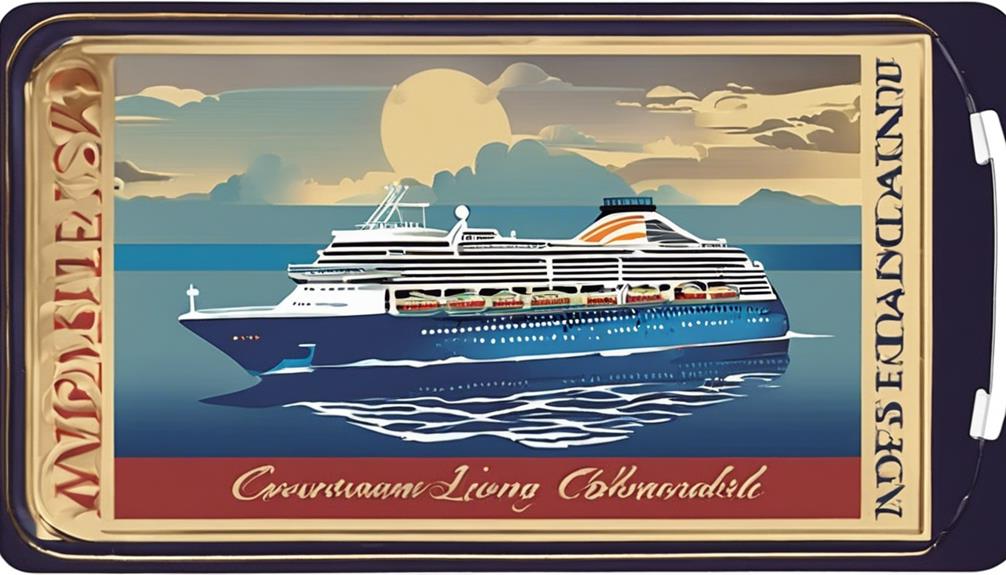
Before we set sail, let's talk about the importance of Cruise Line Luggage Tags to ensure a hassle-free boarding process. When it comes to travel documents, passports, and identification, these tags play a crucial role in making sure your belongings reach your cabin smoothly:
- Easy Identification: Cruise line luggage tags should be securely attached to your bags with your name and cabin number, making it effortless for staff to identify and deliver them to your room.
- Prevent Loss or Damage: Using duct tape to secure luggage tags can prevent them from getting lost or damaged, especially if you're flying to the cruise departure port.
- Smooth Boarding Process: Properly filled out and attached luggage tags provided by the cruise line help expedite luggage handling, ensuring your bags are promptly delivered to the correct cabin, saving you time and hassle during boarding.
Ensuring your luggage tags are correctly filled out and attached will make locating your belongings on the ship a breeze.
Permission to Travel
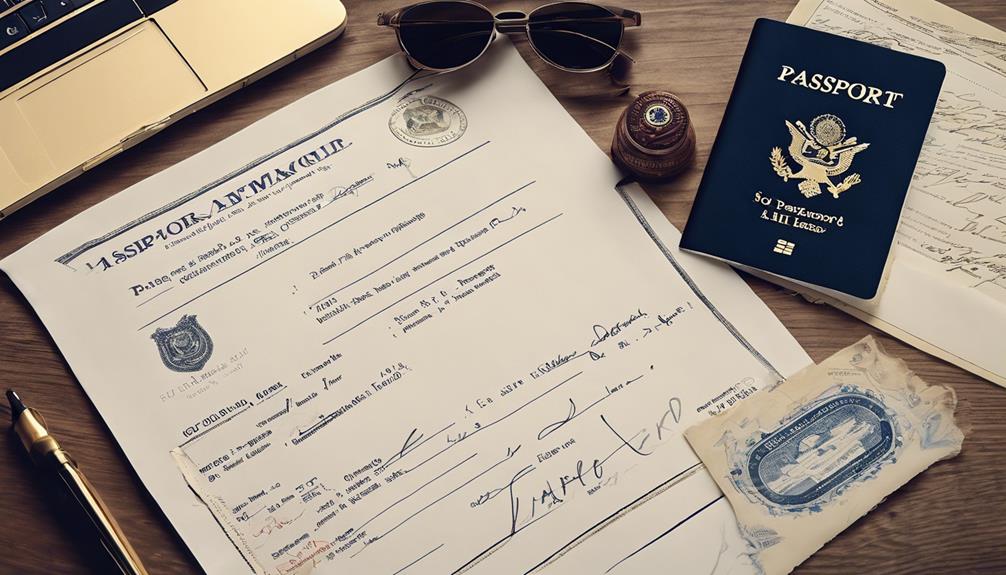
When traveling with minors who will be journeying without their parents, it is essential to have proper permission to travel documentation in place. Notarized consent forms are a crucial requirement for minors traveling alone. Legal guardians must provide authorization for these minors, and the notarized letters should include detailed contact information for the parents or guardians. It is imperative to ensure that minors have all the necessary identification and travel documents with them before embarking on their journey. Airlines and cruise lines have specific rules and regulations regarding minors traveling alone, so it is vital to be aware of and comply with these guidelines to ensure a smooth and hassle-free travel experience.
| Documents Required | Description |
|---|---|
| Notarized Consent Forms | Required for minors traveling alone |
| Authorization Letter from Guardian | Must provide authorization for minors |
| Contact Information | Include detailed info for emergencies |
| Identification Documents | Ensure minors have necessary IDs |
| Airlines/Cruise Rules | Comply with specific travel regulations |
Travel Insurance
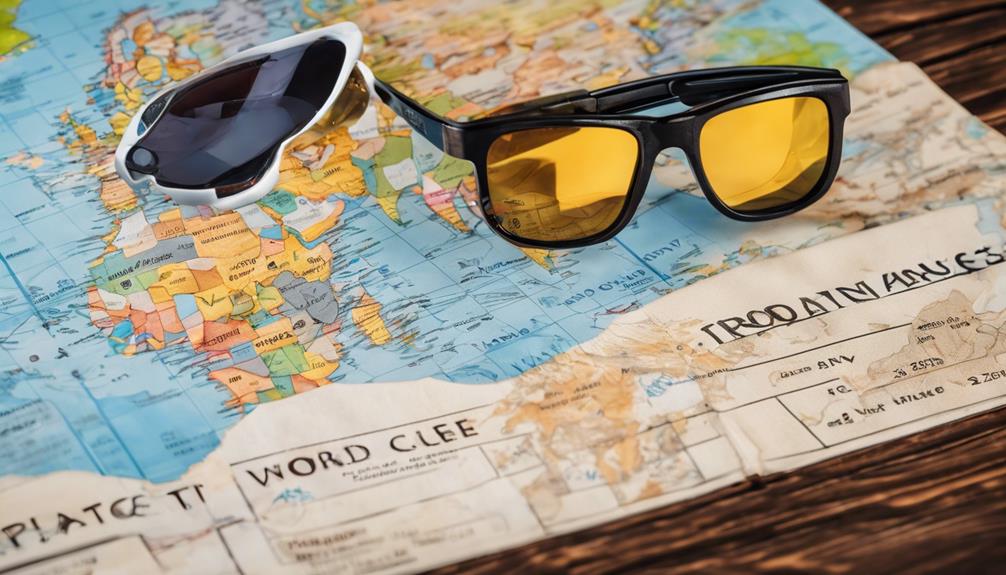
To ensure a worry-free cruise experience, securing appropriate travel insurance is a vital step to protect against unexpected events such as trip interruptions, medical emergencies, and unforeseen cancellations. Travel insurance offers peace of mind by providing coverage for various situations that may arise during your trip. Here are three key reasons why travel insurance is essential for your cruise:
- Trip Cancellation: Travel insurance can help reimburse you for prepaid and non-refundable trip expenses if you have to cancel your cruise due to a covered reason, such as illness or a natural disaster.
- Medical Emergency: In the event of a medical emergency onboard or at a port of call, travel insurance can cover medical expenses, emergency medical evacuation, and other related costs.
- Peace of Mind: Having travel insurance ensures that you're financially protected against unforeseen circumstances, allowing you to relax and enjoy your cruise without worrying about potential financial burdens.
Other Travel Information
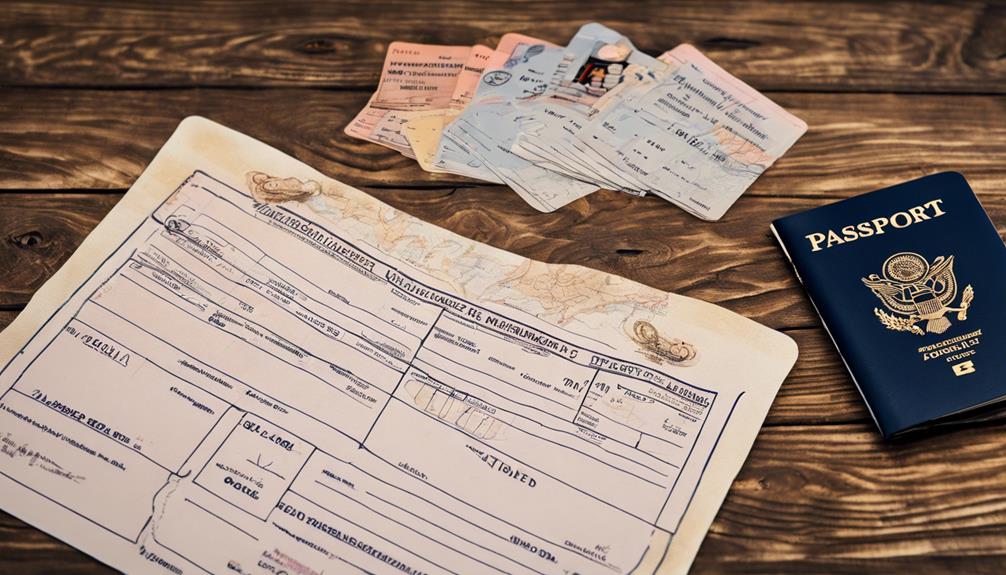
For a smooth and enjoyable cruise experience, it's essential to be well-prepared with other important travel information beyond travel insurance. Before embarking on your cruise, make sure to check the visa requirements for the countries you'll be visiting. Researching and obtaining the necessary visas in advance will help ensure seamless entry into each destination on your itinerary. Additionally, always carry your passport with you as it's a vital travel document.
It is also wise to have a printed list of emergency contacts with you, including important phone numbers such as family members, friends, or the nearest embassy or consulate. In case of any unforeseen circumstances, having these contacts readily available can be invaluable. Moreover, make photocopies of essential documents like your passport, driver's license, and credit cards to have backups in case the originals are lost or stolen during your travels.
Emergency Contacts
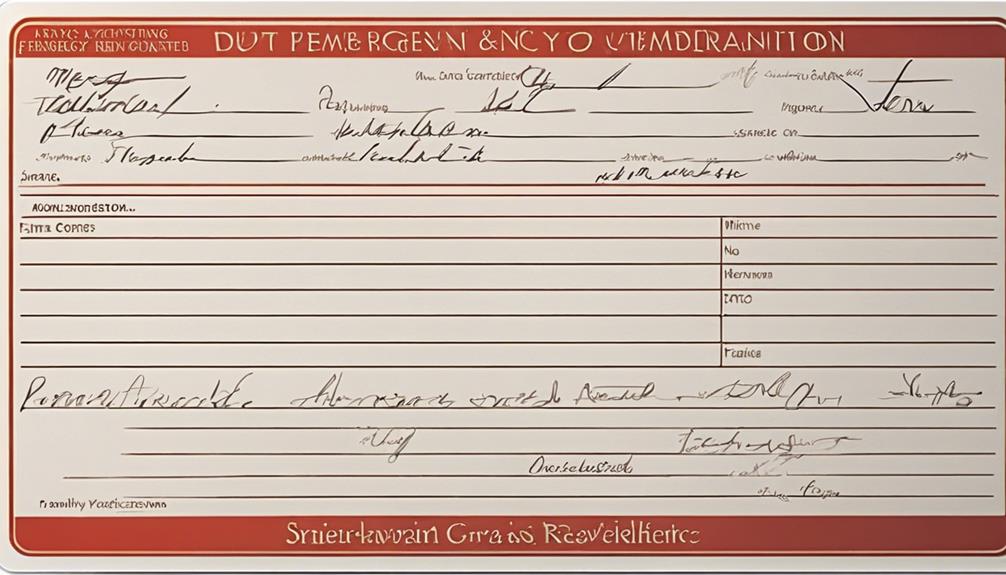
In times of unexpected events, having a printed list of emergency contacts with essential phone numbers can provide crucial assistance during your cruise journey. When preparing your emergency contact list, consider including contact information for your doctor, credit card companies, bank, embassies, or consulates. This ensures that you have the necessary phone numbers readily available for assistance in case of emergencies while traveling.
It's vital to keep a copy of these contacts in your wallet or travel bag for quick and easy reference. Familiarizing yourself with the procedures to follow in case of a lost passport or issues with your travel funds can also be beneficial during emergencies. By having these important numbers on hand, you can navigate unforeseen situations with more confidence and ease.
Photocopies of Documents
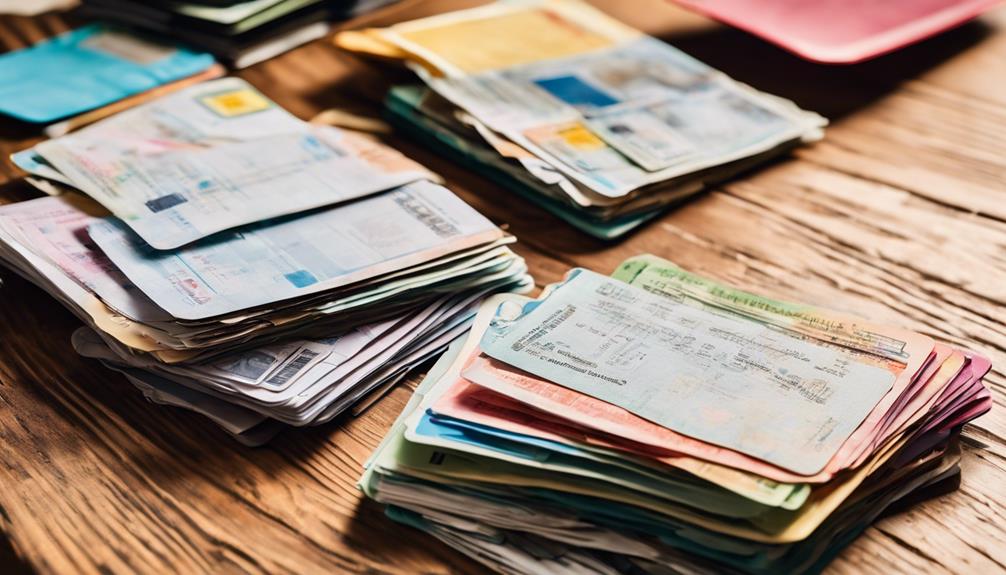
When traveling, we always make sure to have photocopies of essential documents like our passport and credit cards.
It's crucial to keep these copies separate from the originals for added security.
Having backup documents can be a lifesaver in case of any unforeseen circumstances.
Importance of Copies
Securing photocopies of essential documents before embarking on a cruise ensures readiness for any unforeseen circumstances. Carrying copies of important documents such as passports and IDs can be a lifesaver during travel. Here are three reasons why photocopies are essential:
- Quick Replacement: In case of loss or theft, having photocopies of passports and IDs can expedite the process of obtaining replacements.
- Easy Access: Keeping copies separate from originals ensures easy access to necessary information while on the go.
- Safekeeping: Storing photocopies in a secure location apart from the originals minimizes the risk of potential issues if the original documents are misplaced.
Having photocopies of crucial documents adds an extra layer of security and convenience to your cruise adventure.
Safekeeping Backup Documents
To safeguard your cruise experience, it's crucial to securely store backup copies of your essential documents like passports and IDs. Make photocopies of these vital items, such as your driver's license, birth certificate, and credit cards, and keep them separate from the originals in case of loss or theft during your cruise.
Store these photocopies securely in a different location from the originals to ensure easy replacement if needed. Having photocopies of your documents can expedite the process of replacing lost or stolen items while traveling, providing peace of mind during your journey.
Ensure the photocopies are easily accessible and kept in a safe place throughout your cruise for added security and convenience.
Accepted Identification
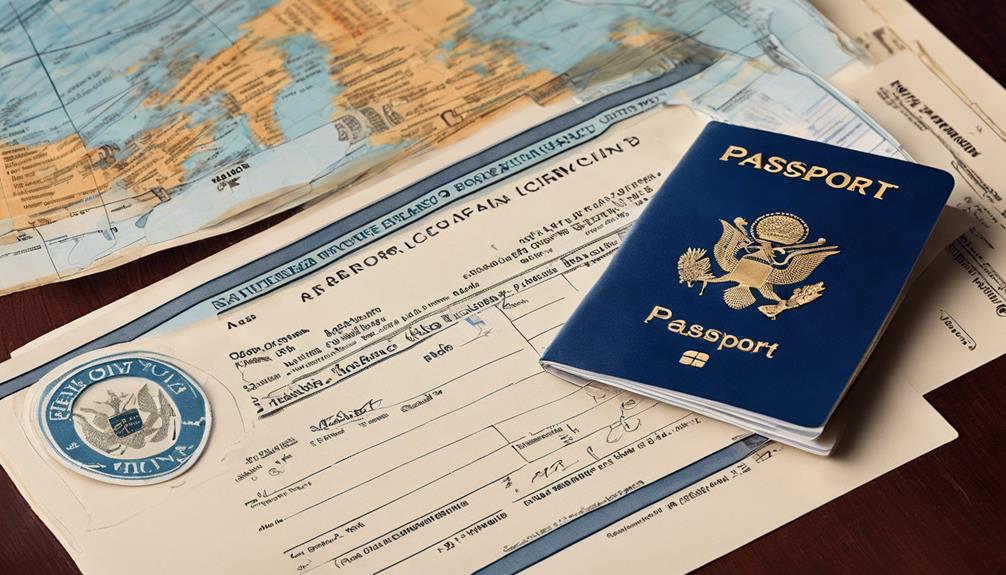
For most cruises, U.S. citizens can use a valid U.S. passport book or passport card as accepted identification. This essential document ensures smooth boarding procedures and compliance with international travel regulations.
Additionally, U.S. permanent residents must carry their original green card as accepted identification.
In cases of closed-loop voyages, an original birth certificate along with a driver's license can be acceptable forms of identification for U.S. citizens.
It's crucial to verify that all identification documents match the names on the cruise reservation and other travel paperwork to prevent any hiccups during embarkation. Ensuring you have the correct identification is fundamental to enjoying a worry-free cruise experience.
- U.S. citizens: Valid U.S. passport book or passport card
- U.S. permanent residents: Original green card
- Closed-loop voyages: Original birth certificate and driver's license
Travel Document Requirements
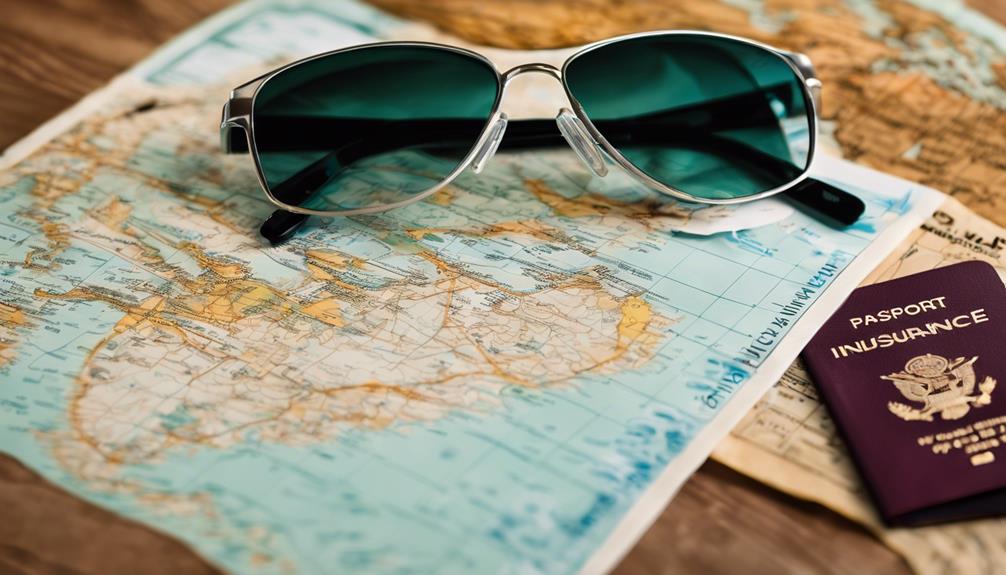
When preparing for a cruise, ensuring your passport meets validity requirements is crucial for seamless travel.
It's also important to research visa regulations for the ports on your itinerary to prevent any last-minute hassles.
Don't forget to have your boarding pass essentials handy to breeze through embarkation processes smoothly.
Passport Validity Requirements
Ensuring your passport remains valid for at least six months beyond the conclusion of your cruise is crucial for smooth travel experiences. Remember these important points regarding passport validity requirements:
- Renewal Time: Check your passport's expiration date well in advance of your cruise to avoid any last-minute issues.
- Extra Pages: Opt for a 52-page passport if you're a frequent traveler or plan to visit multiple destinations.
- Visa Check: Verify if you need a visa for any of the ports on your cruise itinerary and complete the necessary requirements early on.
Having a valid passport and understanding the associated requirements will help you sail smoothly through your cruise adventure.
Visa Regulations for Ports
Understanding the visa regulations for ports is essential for smooth entry and compliance with local laws during your cruise travel. Visa requirements can vary significantly from port to port, with some countries mandating specific visas for entry. Certain cruise lines offer assistance to passengers in obtaining the necessary visas for ports on the itinerary.
It's crucial to check official government websites for accurate and up-to-date visa requirements for each port you'll be visiting. In some cases, visas can be arranged by the cruise line upon arrival in certain countries. By being well-informed about visa regulations and ensuring you have the proper documentation, you can avoid any complications and enjoy a hassle-free port entry experience.
Boarding Pass Essentials
Upon embarking on a cruise adventure, ensuring you have your boarding pass essentials in order is crucial for a seamless and stress-free travel experience. When preparing for your cruise, make sure to have the following items ready:
- Boarding Pass: Whether electronic or printed, your boarding pass contains vital information for your journey.
- Identification: Carry your passport and any other necessary identification documents for check-in and port visits.
- Luggage Tags: Attach provided luggage tags with your name and cabin number to easily identify your belongings onboard.
Having these essentials organized and readily accessible will make your boarding process smooth and efficient, allowing you to focus on enjoying your cruise to the fullest.
How to Carry Documents

To keep all essential cruise documents organized and secure while traveling, consider using a document organizer or travel wallet. These handy accessories not only keep your passport, driver's license, and other important papers in one place but also provide protection from wear and tear. For added security, opt for a waterproof document holder to safeguard your documents from unexpected spills or rainy weather.
When carrying your documents, it's crucial to keep them in a secure location, such as a carry-on bag or purse, to prevent loss or theft. Designate a specific pocket or compartment in your bag solely for important travel papers to ensure easy access and organization. Additionally, make digital copies of your documents and store them in a secure online location for backup in case of emergencies.
Related Essentials
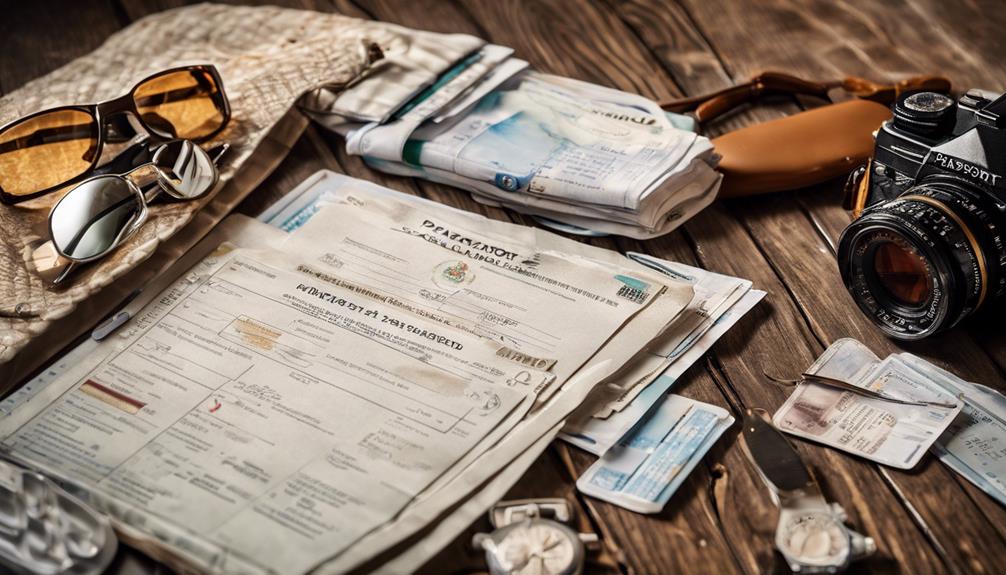
When preparing for a cruise, gathering the related essentials beyond just documents ensures a smooth and enjoyable travel experience. Alongside your passport and identification, having travel insurance can provide peace of mind and financial protection during your cruise adventures. Here are three essential items to consider:
- Passport: Your passport is your ticket to international travel and a requirement for most cruises. Ensure it's valid for at least six months beyond your cruise dates.
- Identification: In addition to your passport, having a secondary form of identification, such as a driver's license or government-issued ID, is essential for various situations during your trip.
- Travel Insurance: Protect yourself against unforeseen circumstances by investing in travel insurance. This coverage can assist with trip cancellations, medical emergencies, and other unexpected events that may arise while cruising the high seas.
Frequently Asked Questions
What Documentation Is Needed to Go on a Cruise?
We need valid passports for most cruises, especially international ones. U.S. residents should carry green cards. Some cruises accept birth certificates and licenses for closed-loop voyages. Health forms and COVID-19 vaccination proof may be required. Visa requirements vary.
What Proof of Identity Do I Need for a Cruise?
We need a valid passport book or card for most cruises. U.S. permanent residents should bring their original green card. Closed-loop cruises may accept a birth certificate and driver's license. Having the right proof of identity ensures smooth boarding.
What Documents Do I Need to Cruise Without a Passport?
We can cruise without a passport on closed-loop trips starting and ending at a U.S. port within the Western Hemisphere. We need an original birth certificate and a driver's license instead. Passports are recommended for added ID and emergencies.
What Documents Do I Need to Cruise on Carnival?
We need a valid passport book or card for most Carnival cruises. U.S. residents must bring their green card. Some closed-loop trips may allow a birth certificate and license. Ensure passports are valid for 6 months post-cruise. Check Carnival's specific requirements.
Conclusion
In conclusion, having the essential documents for a cruise is key to a stress-free and enjoyable travel experience. By ensuring you have your passports, visas, boarding passes, health information, and destination-specific documents in order, you can sail smoothly through your vacation.
Remember to also carry your accepted identification and any required travel documents to avoid any last-minute hiccups. So, pack your bags, grab your documents, and get ready for an unforgettable adventure on the high seas!

